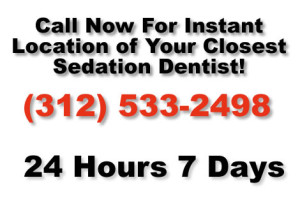In some cases, people develop fear of dental procedures and Sedation dentistry Chicago can ease this fear. People with strong fears or phobias of dental treatment can benefit from sedation. The fear is released, the patient feels relaxed. Often a dental treatment is made possible in the first place. For the serving dentist, this may mean a better job done. This may be an increased focus on the quality. It must be performed no more compromise treatments. Compared to general anesthesia anxious patients can be treated satisfactorily with far less effort.
For the dentist, such patients mean additional stress and sometimes considerable loss of time. Appointment without prior cancellation failures often occur as well. Although adequate pain relief is possible with dental treatments sedation dentistry may be preferred over this. Call your local Chicago Emergency dentist to locate the closest sedation dentist near you.
Especially in the dental treatment of children sedation can bring benefits. In this group, however, oral administration is preferred. An intravenous administration in children and adolescents less than 16 years of age is not recommended. Also, the antidote should not be used due to a lack of available data in children under 16 years. In our experience, the children’s oral sedation has not proved too effective. To complete a successful treatment, there must be a certain amount of cooperation from the outset. The children, who require sedation, because the compliance is very low, are usually still not be adequately treated during sedation.
The sedation very old patients (> 80 years) should be dispensed in a dental practice without the presence of an anesthetist. Especially in these patients, this could lead to respiratory depression.
The patient cannot be expected to be successful and satisfactory to both parties sedation. This presupposes that a sufficient intellect, insight and cooperation.
Since it is not always predict how a patient individually administered sedatives responding (very large fluctuation, especially in the elderly), the attending dentist emergency measures must be handled safely if something deeper sedation (“deep sedation”) reaches a desired and spontaneous breathing and protective reflexes are partially or completely suppressed.
Prior knowledge of the risk profile of the patient to assess the risk of complications and possibly to involve an anesthesiologist is required.
. A simpler classification into “risk patient” or “non-risk patient” is more appropriate. At-risk patients, ie patients with pre-existing conditions that could adversely modify sedation, sedation should be dispensed with in practice or an anesthesiologist be consulted.
Major surgical interventions (eg, external sinus lift, extraction of all four wisdom teeth) moderate sedation increases patient comfort and thus the overall satisfaction with the surgery, so just cases in which the procedure takes a little longer.
Another indication is the treatment of people with physical or mental disabilities. Here, the treatment can proceed much more relaxed, even if the dosage needs to be slightly higher in these patients.
